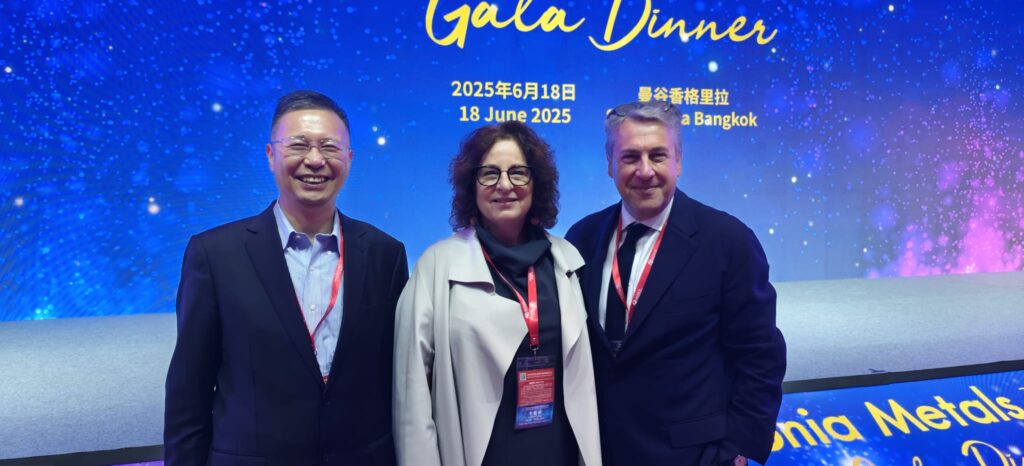ReMA Advocates for Proper Categorization of U.S. Recycled Nonferrous Metal Exports to Thailand
From June 18 to 20, ReMA President Robin Wiener traveled to Bangkok, Thailand for the 2025 Association of Southeast Asian Nations (ASEAN) Recycling Metals International Conference, organized by the Chinese Nonferrous Metals Industry Association (CMRA).
“The ASEAN market is an important growth region for our industry, and I had two opportunities during the conference to talk about the importance of the global trade from ReMA’s perspective,” Wiener said.
Being in Bangkok also gave Wiener the chance to engage with Pattarapon Limpakdee, Deputy Director General of the Office of Industrial Economics with the Thailand Ministry of Industry, to discuss the recent problems recyclers have been having shipping certain nonferrous metals into Thailand.

“Mixed metals from automobile shredding, which contain high percentages of aluminum, known as zorba in the industry, are highly valued by industrial consumers around the world,” Wiener explained. “Most countries have rightfully categorized these materials as not subject to Basel control. However, there’s a misclassification by the Thai Customs of certain recycled aluminum and copper materials—including zorba, insulated copper wire, and motors—as so-called ‘e-waste,’ subject to control under the Basel Convention since January 1.”
In recent weeks, the Royal Thai Government has initiated increased inspections and legal enforcement of imports of certain recycled materials, which has resulted in significant disruption at many Thai ports.
ReMA believes that this effort is the result of the implementation of a strict interpretation of the new Basel Convention Amendments controlling trade in recycled and recyclable electric and electronic materials, commonly known as E-Waste. These Amendments went into effect on Jan. 1, 2025, but many governments worldwide continue to implement changes that may restrict trade in these materials.
The U.S. is not a party to the Basel Convention, so there is a party/non-party trade ban in effect for Basel-controlled materials, such as E-Waste. The U.S. can only trade with countries where an alternative agreement (known as Article 11) has been agreed to, such as the OECD Council Decision, so under their international obligations, parties like the Thai Government must ban the importation of E-Waste exported from the U.S.
ReMA members and media reports indicate that containers of certain nonferrous metals traditionally outside the scope of the Basel Control mechanisms are being held or rejected because the materials have been deemed to be E-Waste.
In Washington, DC, Adam Shaffer, ReMA’s Vice President of International Trade and Global Affairs, continues to raise this issue with the U.S. EPA, Commerce Department, and the Minister of Commercial Affairs at the Royal Thai Embassy.
“While my goal was to ensure the Thai government understands the issue at hand, I was also able to provide the Royal Thai Embassy in DC with a lot of education on our industry more broadly,” Shaffer said. “We talked about the differentiation between municipal waste products and our materials, which are valuable manufacturing inputs. We recognize that a government-to-government solution is likely needed here, and we will continue to engage with the Commerce Department and EPA at the soonest.”
Though U.S. shippers have been hit particularly hard, this issue is a global concern and has the potential to disrupt as much as $1.7 billion in U.S. exports to Thailand alone. At least one shipping line, Maersk, has stopped shipping recycled metals into Thailand until this is resolved.
“The goal of the Basel Convention is to prevent hazardous waste and select nonhazardous waste dumping into countries that cannot properly handle these materials,” Shaffer added. “I reiterated to the Thai Embassy that their own manufacturers want these materials.”
ReMA has been engaging with the Bureau of International Recycling (BIR) on this issue as global recyclers will also be impacted by the Thai Government’s strict interpretation of the Basel E-Amendments, which would require prior informed consent (PIC) for imports from non-U.S. recyclers. On Wednesday, June 25, BIR submitted a letter to the Thai government regarding the association’s concerns over the interpretation of Basel Convention E-Waste Amendments concerning nonferrous metal fractions.
“While in Bangkok, Arnaud Brunet, my counterpart at BIR, and I tried to seek resolution to this issue,” Wiener said. “This is an issue that requires facilitation of government-to-government discussion. We’re trying to prevent the inadvertent misstep of expanding the Basel Convention to materials it was never intended to cover. If Thailand sets a precedent, then it will be easier for this to happen in other countries and to effectively extend the Basel Convention to nonferrous metals, which it wasn’t intended to do.”
In terms of next steps, ReMA has been in talks with various stakeholders about potential short- and long-term solutions to this problem.
“Together with BIR, we have provided Mr. Limpakdee with language from the Austrian government because the Austrian government has put out clarifications to help their own customs agents understand what is and isn’t product, and it includes this material,” Wiener said.
During his meeting with the Thai Embassy, Shaffer discussed the possibility of creating an export certification standard, another potential long-term solution to this problem.
“With this type of tool, governments could have the confidence that these traders are above board, understand the rules, and understand our specifications,” he said.
ReMA will continue to monitor this ongoing issue and update its members accordingly.
